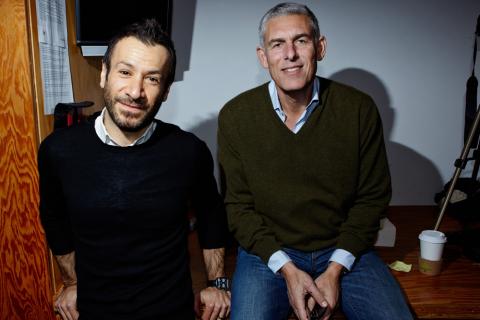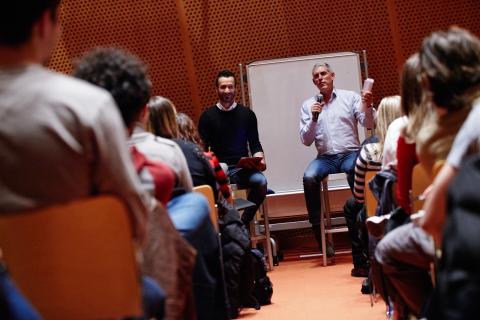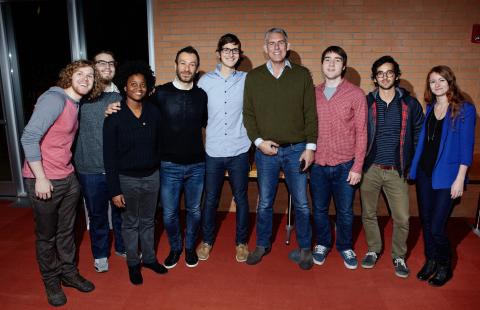Hipsters and Hackers: Berklee Meets MIT

Panos Panay, left, and music industry executive Lyor Cohen.
Photo by Dave Green

Cohen talks to students in MIT's Stata Center.
Photo by Dave Green

Students brainstorm ideas during a breakout session that followed Cohen's talk at MIT.
Photo by Dave Green

Berklee students pose with Panay and Cohen. From left to right: Nash Atkins, Paul Garcia, Myrish Spell, Panos Panay, Kyle Billings, Lyor Cohen, Seth Bella, Jose Parody, Melanie Stevenson.
Photo by Dave Green
How do you ensure an entrepreneurial future for the music industry? One answer you'll hear, if you ask Panos Panay, founding managing director of Berklee's new Institute for Creative Entrepreneurship, is to make sure it's easy to get across Boston's Charles River.
One of Panay's first goals as he was preparing to join Berklee was to work with Music Business/Management chair Don Gorder and MIT senior lecturer Ken Zolot to pave the way for seven Berklee students to participate in Zolot's Founder's Journey class, a semester-long course fostering dialogue between industry leaders and the young people who may someday launch their own successful enterprises in music and other fields.
Once Panay—the founder of Sonicbids and a 1994 Berklee graduate—and Gorder provided Berklee business majors with a reason to head across the river to MIT, the students began to discover a natural fit between their worldview and the generally more technical focus of MIT students.
"This kind of collaboration is really exciting to me," says Kyle Billings, a sixth semester music business/management major. "A lot of students in the Berklee community don't necessarily realize the value of interacting with MIT students. It's exciting to see that there's people interested in working on this problem with a different mindset."
The problem Billings is referring to is the challenge of creating new business models and career paths in an always-evolving music industry. And it's one the final lecturer of the semester, Lyor Cohen—former head of Def Jam and former North American chairman and CEO of recorded music for Warner Music Group—understands intimately.
"With his new label, 300, Lyor wants to see if he can improve his batting average through data collection," says Panay. "He wants to use data to predict and earmark artists that will be successful, and translate that into a better economic model that affects everyone across the board, down to the contracts you can offer these artists."
Billings—who is editor-in-chief of Berklee's Music Business Journal—says the Cohen lecture provided a strong ending to a course that enabled him to speak directly with leading executives from a number of companies, including Harmonix and Dropbox.
"It was a great culmination of the entire semester," says Billings. "He's bringing together music and technology with his new label. For Lyor to come here, it's like saying, 'Hey, everybody, this is the kind of stuff that's possible.'"
Panay summed up such collaboration by quoting Bill Aulet from MIT's Martin Trust Center for Entrepreneurship. "He says that, 'to succeed in business today you need a hacker, a hustler, and a hipster.'" Panay says that Boston-area schools can provide the players, with the hipsters coming from Berklee, the hustlers from Babson and Northeastern, and the hackers from MIT.
The collaborating has begun. The future of music awaits.
